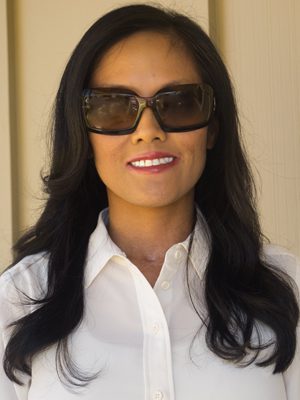Berkeley Public Health student profile: Sherry Pablo

- MPH student, Health Policy and Management
- Expected graduation: 2022
- Hometown: San Francisco, CA
- Currently lives: Richmond, CA
- Preferred pronouns: she/her/hers
Why did you choose to go into public health and why did you choose Berkeley Public Health for your degree?
I was drawn to public health because of its focus on prevention and health systems change on a macro-level, impacting groups, communities, and populations. Losing my sight as a young adult, being a patient myself, and my lived experience as someone who is blind and disabled, I’ve faced challenges navigating healthcare spaces and programs. This fuels my drive to make the patient experience more equitable and accessible for the disabled community. I chose Berkeley Public Health because of its cutting edge research, its focus on diversity and social justice, the rigor of classes, networking opportunities, and the funding and support from the Kaiser Permanente Public Health Scholars program and other funding options.
Can you tell us why you chose to concentrate in Health Policy and Management?
The HPM department fits my interests in learning more about health policy and how it shapes the structures of the U.S. healthcare system, financing, and access. Working on an opioid safety project before coming to UC Berkeley, I saw firsthand how policy can move interventions forward and how they dictate types of programs and services offered. I like working with people, building relationships, and working on projects behind the scenes. For these reasons I was also drawn to the management and business side of healthcare.
What’s your favorite class or professor so far?
All of my classes have been interesting. One class I found helpful during my summer internship was Digital Health Design and Evaluation with Courtney Lyles. I’ve also enjoyed Health Care Finance and Strategic Management, both taught by Kim MacPherson.
What element of public health would you most like to change?
I would encourage the public health community to see disabled people not just as recipients of public health programs and services, but as leaders and providers in this space as well. There needs to be more emphasis placed on targeted universalism and accessibility in the design of programs and policies. Public health also needs to examine the historical ways the disabled have and continue to be excluded in society in order to root out ableism, and I hope as we continue to grow as a community courses on public health and disability are offered to educate upcoming public health changemakers of the diversity and needs of the largest minority group in the country.
What would you like to do with your degree after graduation?
I am interested in gaining more experience through an administrative or management fellowship program in healthcare where I can move into a leadership position and implement improvements in the accessibility of programs and services for people with disabilities. The field of public health and healthcare lacks disability representation in positions of leadership, and I want to mentor and encourage other disabled people to enter public health.
How do you think Berkeley Public Health has set you up for success in your future career?
I have been supported and encouraged by the HPM faculty, professors, fellow students, and staff to keep moving forward, despite my own doubts and fears. Berkeley has provided me with countless opportunities to network with alumni in the field who have given me valuable insights that have been helpful in my internship and professional development. Without the class selection and strength of my courses I’ve taken so far at Berkeley, I would not have the confidence I have now to enter a space and believe I can make a difference. I know my perspective is important and needed in public health and Berkeley has helped me realize that.